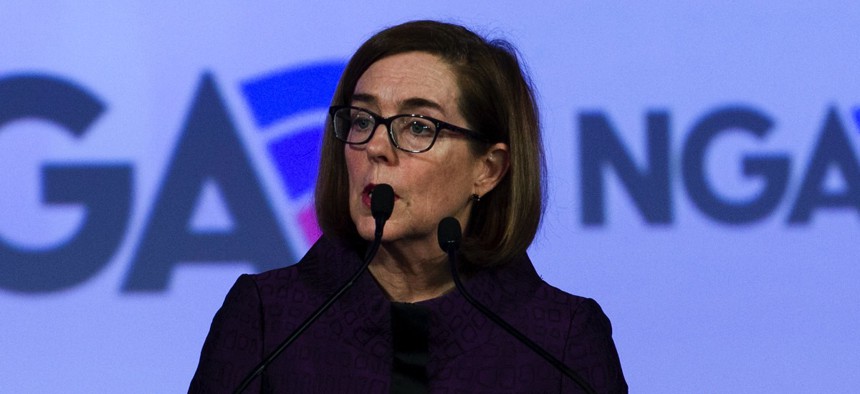States Want More Money and Less Punishment Over Opioids

Oregon Gov. Kate Brown Jose Luis Magana / AP Photo

Connecting state and local government leaders
“To fully address the crisis we have to treat it as a health care issue, as a child welfare issue and as a drain on our local economies,” said U.S. Sen. Patty Murray of Washington state.
WASHINGTON — The governors of Maryland and Oregon asked senators Thursday to step up funding and coordination with states tackling the evolving opioid crisis, while rejecting a “punitive approach” to addiction.
Testifying before the Health, Education, Labor and Pensions Committee on Capitol Hill, Maryland Gov. Larry Hogan said nearly 2,000 people died from opioid overdoses in his state last year—more than firearm- and vehicle-related deaths combined.
Oregon Gov. Kate Brown illustrated the toll opioids were having on child welfare in her own state, where about 60 percent of kids in the foster care system have at least one parent with a substance abuse issue.
“Right now the federal government recognizes the problem but is focused on punishment,” Brown said. “That leaves us, the states, to right the wrongs of a war on drugs that has done nothing to address the issues that drive this public health crisis, while our prisons and our foster care systems are filled to capacity with its victims.”
The epidemic has affected almost every state, with the Centers for Disease Control and Prevention recently reporting a 30-percent increase in emergency room visits nationally for suspected opioid overdoses between July 2016 and September 2017. Data from 16 states hit hard by the crisis showed eight with increases in ER visits for suspected opioid overdoses of 25 percent or greater.
Maryland implemented a regional prescription drug monitoring program and limited the number of pills physicians could prescribe, only for heroin distribution to increase—followed by that of fentanyl and carfentanil. Addicts are killing themselves with a single use of fentanyl, which is also being used to lace cocaine in the state, and carfentanil is 50 to 100 times more deadly.
“I was the first governor in America to declare a real state of emergency on this issue because we decided that we needed to treat this crisis just like we would treat any other natural or manmade disaster,” Hogan said.
The Republican governor estimated Maryland has spent a half-billion dollars fighting the opioid epidemic. Fentanyl use was up about 70 percent in Maryland in 2017, trafficked in from China and Mexico, prompting Hogan to ask for more funding to track delivery services and for increased federal interdiction through the Stop Trafficking in Fentanyl Act, currently in the House of Representatives.
Brown, a Democrat, said Oregon would use any additional federal funds to get affordable, generic overdose drugs like naloxone, or Narcan, into the hands of all first responders and invest the remainder in behavioral health and substance abuse treatments. A prescription is no longer needed to get the drug over the counter in Maryland, per state law.
“States really are the ones that come up with the best ideas to tackle big problems because states are on the front lines,” said Sen. Lamar Alexander, a Tennessee Republican and the committee’s chairman. “It’s usually the federal government’s role to encourage them to cut the red tape and create an environment where states and communities can innovate.”
Hogan characterized himself as “a states’ rights guy,” like Alexander, but said more federal standards were needed for things like e-prescribing because states can’t control what’s occurring on the internet.
Meanwhile, Oregon’s governor wanted to see the federal government outline a more comprehensive approach to pain management and enable her state to make substance abuse treatment available to anyone in custody.
Oregon’s legislature recently passed a bill ensuring a “warm handoff” of patients with addictions from emergency rooms to peer mentors that can get them into treatment, and Brown will issue an executive order soon requiring a comprehensive strategic plan for treatment programs statewide.
“One of the challenges that we face in this arena is that the data, in terms of the physicians that are able to prescribe medically assisted treatment, that’s not available to the states,” Brown said. “It would be extremely useful if we could access that information.”
State and federal governments are starting to take a hard look at drug companies’ role in creating and sustaining the opioid crisis.
Massachusetts leads a bipartisan coalition of 41 states investigating drug manufacturers and distributors, said Democratic Sen. Elizabeth Warren, and more than 30 of her state’s cities and towns have launched lawsuits. Hogan said he’d directed Maryland’s attorney general to target pharmaceutical companies where appropriate, and the Justice Department also just started a Prescription Interdiction & Litigation Task Force.
Oregon was the first state to receive a settlement, north of $1 million, from drug maker Insys Therapeutics over deceptive marketing and payments made to sell an opioid. More than half that money went back into opioid treatment and recovery while a portion went to the Oregon Health and Science University, Brown said, advocating for a “case-by-case” approach to targeting CEOs where wrongdoing appears “egregious.”
“We have seen after far too long that we can’t simply treat this as a law enforcement issue,” said Sen. Patty Murray of Washington, the committee’s ranking Democrat. “To fully address the crisis we have to treat it as a health care issue, as a child welfare issue and as a drain on our local economies.”
Dave Nyczepir is a News Editor at Government Executive’s Route Fifty and is based in Washington, D.C.

NEXT STORY: The Health-Care Gap Between Red and Blue America





